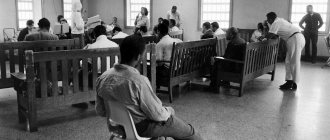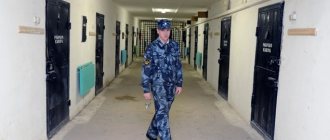Where do the bees sit?
“Bees” are former police officers, judges, prosecutors, FSIN employees, judges and military personnel.
They are kept in special prisons, of which there are about a dozen in the country. There are the fewest judges in such zones, who rarely end up in prison. Moreover, even those who have worked as an ordinary police officer for at least a month end up in prisons for employees of state institutions. In the zones where the "Bees" sit, thieves' orders do not apply. Generals and lieutenants are on equal terms. Each “Bees” believes that they entered the zone by mistake.
Former law enforcement officers will never be sent to prison with ordinary prisoners. After all, they can be “sewn on” on the very first day of their stay.
What not to do at night
Convicts have to live in very crowded conditions. The situation in the cell is almost always extremely tense. In order not to provoke conflicts, each prisoner adheres to certain rules of behavior. The main task in the “hive” is not to disturb anyone and not to allow others to do so.
Snoring is strictly forbidden in prison, and no one cares if a neighbor has breathing problems or a broken nose. They wean off snoring very quickly and hard. For example, they can pour water into the mouth of a sleeping prisoner or put out a cigarette on his ribs. A couple of such lessons lead to the fact that a person learns to sleep silently and at any time of the day.
Anyone who doesn't sleep at night has fun as best he can. Usually the inmates play cards and other gambling games. The first mover should not even try to wedge himself into the game of experienced prisoners. With 100% probability he will be a loser, and duty in the zone is a sacred matter. Newcomers who fall for this bait have to beg their relatives to send money. Often we are talking about substantial sums of money, for which they can kill.
What not to do in a cell at night
In conditions of confinement, when a mass of people are in a crowded state for months, or even years, “smooth” relationships, without “jambs,” are valued. A person should try not to disturb anyone and not to let anyone down if he does something that is not his understanding. People in zones and prisons can stop snoring very quickly. There are many ways to do this, from pouring water into the open mouth of a snorer, to painful pokes under the ribs. Over time, the prisoner gets used to falling asleep silently at any time of the day or night when such an opportunity arises. At night, especially if the prisoner’s control regime weakens, prisoners in their cells entertain themselves with gambling. Experienced prisoners advise newcomers not to interfere with such gamblers, because it is impossible to win against them, and losing in prison is a sacred duty, it must be repaid in any case. Often, the losers ended up having to get, by begging their relatives and friends in freedom, colossal sums of money comparable to the cost of the apartment.
Where to lay your head
In each cell, the number of sleeping places - “beds” - is very limited, and there are always overcrowded prisoners. You have to take turns sleeping. A newcomer who “enters” a cell has to immediately become familiar with local customs. The allocation of places and times for sleeping is the responsibility of the cell chief, or “supervisor.” The first mover should turn to him.
The crowded chambers on the thieves' hairdryer are called "hives." Situations where all prisoners sleep at night at the same time simply do not happen in such places. While some prisoners are somehow trying to doze off, others are awake. Someone is playing cards, someone is talking with a neighbor.
Cells in any Russian prison are divided into zones. Seats near the windows are considered privileged, where there is more light and fresher air. Thieves in law and their entourage settle here. The places closer to the exit are for ordinary prisoners, or “men”. The assistant professor from “Gentlemen of Fortune” absolutely rightfully claimed a bunk near the window, because he is a crime boss.
Several decades ago there was no such obvious division of prisoners by color, so the “lowered” slept with the rest of the prisoners. Usually they were allocated the worst places: under the bunks or near the “bowl”. Now the “roosters” are placed in separate cells for the same humiliated people. Otherwise, violent conflicts will inevitably break out in the hives.
A little comparison
Despite the fact that in some sources the bunk is called a bunk, these two concepts are slightly different from each other. In addition, as many citizens who served an administrative, daily sentence in a temporary detention center know, there are no metal bunk beds there. In the temporary detention center there are only “bunks” - a sleeping place made of boards (most often without a mattress). It is usually attached to the wall and rises slightly above the floor.
What is a bunk in this case? This is also a sleeping place, only a bed, usually metal and in two tiers (places) for prisoners who are in a pre-trial detention center or in a zone. The bunk is intended for proper sleep and rest; it is always covered with a mattress.
The obstinate can relieve themselves
For the purpose of humanization (the corresponding Concept for the Development of the Penitentiary System of the Russian Federation is valid until 2022), so-called lighter conditions of detention have recently been introduced in Russian prisons. For example, in the Balashov “krytka” (Saratov region) six rooms are equipped, in which an almost homely environment is created for the most meek and hardworking prisoners: single-tier beds, additional furniture. You can use tape recorders, video equipment, DVDs. Each such cell houses three to five people. FSIN employees claim that there are more than enough people who want to get into such detachments. True, this does not shine for thieves in law and other inmates who profess “denial” - in comfortable cells sit those who are happy with the prison administration, mainly the household servants of the “krytka”.
Liberalism of the Tulun cover
The most “humane” orders, judging by media reports, existed in the prison of Tulun (Irkutsk region) in the 90s and early 2000s. You could send prostitutes, alcohol, and drugs there for money. It got to the point that prison officers, with the knowledge of the head of the penitentiary institution, used inmates to commit crimes outside the “krytka” territory - they stole cars, even stole vegetables from summer residents. One day they stole blankets and rugs from a kindergarten.
In 2001, four prisoners escaped from the Tulun prison. The guards, violating the instructions, entered the cell and had dummy pistols and a homemade crossbow pointed at them. The FSIN employees who tried to resist were killed on the spot: one was killed with a hammer, the other was pierced with a sharpened electrode from a crossbow. Having overcome all security lines, the fugitives broke free. Half a month later they were caught, and the Tulun high-security “cover” was soon repurposed as a pre-trial detention center after this much-publicized escape from sin.
Army life
In military units you can see massive double beds made of metal, just like in prisons. And even in naval service, sailors have to dream of comfort when they see a sleeping place. From the point of view of linguists, these are the real shkonki! But due to the close connection with criminal jargon, sanctions are possible from senior comrades responsible for discipline if an ambiguous term is used.
Existing orders
Each correctional institution has its own charter. Accordingly, for violating a certain order or rules of behavior established by thieves prisoners, the perpetrator can expect punishment.
In criminal jargon, there is such a thing as “putting someone under a bunk.” Not everyone knows what this phrase means. In simple words, a violent sexual act is performed on the guilty convict, after which he is assigned a place under the bed or under the bunk. You can leave there only strictly with the permission of the elder or the person in charge of the barracks. There were often cases when “lowered” convicts were under the bunks for a whole day.
Mysteries of origin
It is impossible to trace the etymology, although some sources suggest roots in Hebrew or Yiddish. Simply based on the history of the appearance of many other “thieves” expressions. But almost everyone can answer that a bed in a correctional facility or a security facility is a bunk. What could it be like? Depends on the specific establishment:
- bench mounted on the wall;
- collapsible metal bed;
- multi-tiered bunks, etc.
In any case, the speaker means a sleeping place. And its size, shape and quantity do not matter.
They promise to reduce the list of grounds for such punishment
Amendments to the Criminal Executive Code of the Russian Federation are currently being developed, which should specify the grounds for placing an offender in a punishment cell; the current reasons for adopting such a harsh punishment are very vague. In essence, according to the current rules, the “citizen boss” can send a suspect or defendant to solitary confinement for anything, explaining it as a “violation of the regime.” It is expected that the new requirements for justifying the reason for placing a prisoner in a punishment cell will be more liberal: they are supposed to be imprisoned alone only for serious offenses - swearing, fighting, illegal trafficking in alcohol or drugs. For other offenses not specified in the special list of the law, the “godfather” comrades have the right only to verbally reproach. Or the offender will get off with a reprimand. Legislators are also thinking about what exactly could serve as mitigating circumstances for a persistent offender to take the path of correction and change his status. The modern rules by which today's penal system operates do not stipulate a mechanism for the offender to make amends for his guilt before the management of the penitentiary institution.
A small characteristic
So, what shkonka means has become clear. This term refers to a sleeping place in places isolated from society. Usually in pre-trial detention centers and colonies. As a rule, what many convicts remember most is life in the zone. After all, it is there that the convict has his own small corner - a bunk where he sleeps, a chair and a bedside table where he keeps a mug, a spoon and writing utensils. Many prisoners who did not want to work spent almost the whole day in their bunk.
Therefore, when answering the question of what a bunk in a prison camp is, we can safely say that it is a convict’s bed, a place where he can gather his thoughts and rest.
This is interesting
In military units, they install exactly the same bunk metal beds as in prisons and other correctional institutions . Because of this, many soldiers call their sleeping place a bunk.
But officers of military units categorically disagree with this. Still, this term is not advisable to apply to the defenders of the Motherland.
Also, a bunk is often called a sleeping place on a ship . However, naval etiquette also does not accept the use of this word. If the captain had heard that the sailor was saying “shkonka” instead of “bed,” then, for sure, the latter would have been punished.
When answering the question of what a bunk is, we can safely say that it is a sleeping place where a prisoner can spend time.
Young prisoners usually sleep on the top bunk of the bed, and older people usually sleep on the bottom bunk.
Work more, break less
Official representatives of the FSIN and members of the Public Observatory Control (POC, which has prison system institutions in each region) often have different data on the process of humanization taking place in Russian prisons, pre-trial detention centers and colonies.
The position of the Federal Penitentiary Service is that every year the conditions of detention of Russian prisoners are improving and approaching European standards. This especially concerns the occupancy of prison cells. In many “covers” today it is even less than the norm.
The famous Vladimir Central, according to the Federal Penitentiary Service of the Vladimir Region, today is more comfortable in terms of living conditions: the cells on the windows no longer have “eyelashes” (iron blinds), the premises are equipped with televisions, refrigerators and radios. In 2003, in the Vladimir Central Prison, they were the first in the FSIN system to open a Legal Information Center for convicts.
In almost all Russian prisons, the production of products sold outside the “cover” has been established - the Federal Penitentiary Service considers occupational therapy in custody to be an important factor in the law-abiding behavior of prisoners. In the Vladimir Central they make souvenirs with the symbol of the “lid”, they sell well. In the Verkhneuralsk prison they sew work clothes, in Minusinsk they produce building materials. Most Russian prisons have subsidiary farms where convicts grow agricultural products and raise livestock - from chickens to cows.
Regarding working as a security guard
If you visit any forum dedicated to thieves, you will see that the attitude towards this or that specialization in the wild is discussed here. For the most part, civilian professions are considered “legitimate” among thieves in law, but they do not deserve respect. If, for example, a person worked outside as a security guard or a waiter, then in prison he can count on the status of a “hard worker” or a “man.” It is thanks to their work, but not their authority, that the zone exists.
Prisoners who in ordinary life worked in the service sector are not respected by criminals. They are called "Chaldeans", "shnyryas" or "sixes". But in captivity they will be treated leniently. If a former taxi driver or doorman was engaged in “ratting” or “informing” at his previous place of employment, then he can be demoted to a “rooster” or “sniff”. Much depends on how serious the offense was.
It is difficult to hide information about actions in freedom that are not respected in captivity. It quickly reaches the prisoners, and some criminals, who are excellent psychologists, can even learn it from a person, gaining confidence in him.
Questions are often asked on forums regarding serving as a security guard. Conservatives and radicals of the thieves' world believe that they are a waste of work. After all, a thief must steal, but under no circumstances protect someone else’s property. Liberals believe that a security guard has no place in the criminal world, but they cannot charge him with anything for such work.
The situation is a little different with people who completed military service in the internal troops. They are referred to as “Red Pogonnikov”. In some zones the attitude towards such convicts is extremely negative. In others, the “local administration” does not touch them. It is believed that the “Red Pogonnik” did not join the army of his own free will, but was sent there forcibly.
Often people who have completed military service are defined in the zone as “men.” But, this is only possible if the newly minted prisoner puts himself in a position and does not allow himself to be lowered down the hierarchical ladder to the rooster.
As for lawyers, it is quite difficult to say unambiguously what awaits them in the zone. On the one hand, they protect criminals and even thieves in law. But the lawyer could be a former “cop” or a prosecutor, and then he won’t have to count on respect. If a lawyer helps the gang in the zone, for example, by filing lawsuits and writing complaints, then he will sit “evenly” and can even count on some patronage from the world of thieves. A striking example of a lawyer who feels at ease in the zone is Dmitry Yakubovsky.
The fate of a person who went to prison and was involved in professions that promote non-traditional sexual orientation cannot be called enviable. The same can be said about former models, dancers and strippers. The prisoners treat them with disdain.
Drank in privacy
The “brother” of the punishment cell is the punishment cell, the punishment cell. People are put in a punishment cell at the stage of preliminary or judicial investigation if a preventive measure in the form of detention is chosen against them. Those in the punishment cell are those who have already been sentenced by the court and who entered the zone or “krytka” as a full-fledged convict. The main restrictions for those in a punishment cell and a punishment cell are the same. The law establishes different periods of stay in a punishment cell for adults and minors. Young children are placed there for a maximum of 7 days; for others, the period of solitary confinement can last up to 15 days and nights. You can get into solitary confinement with a folding bunk for “attacking” your cellmates, fighting with the warden, or simply for not getting up when the “citizen boss” entered the “hut.” They will be put in a punishment cell if they find homemade mash (and any other alcohol) on the suspect or accused; they can also be forced into seclusion for drinking alcohol, as well as for possessing anything prohibited, including food. Those who have two or more reprimands are also candidates for being sent to a punishment cell. The legislation distinguishes many of the above reasons for placement in a punishment cell for incidents that require disciplinary retribution and criminal prosecution. For example, if the defendant attacks the judge during the trial, he will inevitably commit an additional crime to the existing one. But when, for example, a prisoner curses at the warden, and the offended person does not write a complaint against the prisoner, the incident is not considered a crime - the offender can only count on being placed in a punishment cell. By law, only those who can be there for health reasons are placed in a punishment cell. If the punished person falls ill during solitary confinement, then the prison administration has no right to continue keeping him in the punishment cell.
A little about the main thing
Criminal concepts can often be heard not only on television or radio, but also from other people who, by the will of fate, once served a sentence for committing criminal acts in a colony. Thus, many words from thieves' jargon have entered the everyday life of the citizens of our state. However, not everyone knows the definition of criminal terminology. For example, what is a shkonka? Only a person who leads a law-abiding lifestyle may be interested in such a question, if he not only has not been in a zone or in a pre-trial detention center, but has never even crossed the threshold of a temporary detention center, where ordinary citizens (without a criminal record) often serve an administrative sentence in the form of arrest ). So, a bunk is usually called a bed in correctional institutions. In many colonies, this is the only name given to the place where the convict sleeps during curfew hours.
The will to remember, but not to speak
At first, pioneers constantly want to remember their free life. It is difficult for them to come to terms with their new status, so they are drawn to pour out their souls to someone. This is skillfully used by hardened prisoners. During the first months of imprisonment, a lot of provocative information can be extracted from a newcomer. In the wild, this information will not harm anyone, but in the zone it will decide the fate of the prisoner.
Even when chatting about some abstract topics, you need to be extremely careful. You can become an outcast and join the ranks of the “roosters” because of the information that you once danced in a strip club, gave oral sex to a woman (even your own wife), or collaborated with the authorities. Under no circumstances should you admit your non-traditional sexual orientation.
The prisoners listen to all this information very carefully, after which they pass a new sentence on the prisoner: to be an ordinary “man” in the zone or to turn into a “rooster” and wear this mark for the rest of his life. Any word spoken recklessly can lead to catastrophic consequences.
In order not to become a hostage to your own talkativeness, it is important to be able to carefully avoid provocative questions. You will have to do this constantly, because in prison, talking and trying to catch your interlocutor is the only entertainment
Life and work under lock and key
In the Tobolsk special prison there were three residential two-story buildings: two for workers and one for non-workers. The working buildings accommodated 400 people each, and the non-working special building No. 2 – about 300. The special building contained malicious violators and those who categorically refused to work. Thieves in law were also sitting there. It contained about 50 general (five-bed) cells and about the same number of “double” and “single” cells, which housed those who, for one reason or another, could not sit in general cells. Common cells were located on both floors on one side of the corridor, and “doubles” and “singles” were located on the other. Apart from a short daily walk in a small courtyard, prisoners in the special building had no right to anything else, except to go to the bathhouse once every ten days - in the same cell where there was hot water and several basins. In the work buildings, conditions were better: the cells were more spacious, there were more opportunities for communication. From the “bad” cells—they were called “itch” cells—prisoners were taken to work separately. The “good” cells had a common conclusion: ten cells were opened and about a hundred people were taken out simultaneously through an underground tunnel into the work building
There, people went to their working cells and were kept under lock and key until the end of their shift. “Press Hut” for a careless word Tobolsk prison, like any other, had a depressing effect on a person’s mental health. Human life was worth nothing there
Any warden could, with one careless word, put a prisoner in a press cell, where he could be mutilated, violated or killed, and then present it as a heart attack. And in order to deprive him of the opportunity to defend himself, they put him in a punishment cell where the prisoner was stripped naked. There was no point in resisting. Imprisonment in a punishment cell was widely practiced. This is a special room in which prisoners convicted of violating prison order were kept. In the punishment cell, prisoners were kept under a stricter regime than in ordinary cells. There were rats in some punishment cells, there was ankle-deep water in the rooms, and the ceilings were low. In the press cells - they were also called “press huts” - the prison authorities dealt with unwanted prisoners at the hands of other prisoners. Press cells were formed and staffed from among angry, physically strong, but morally broken prisoners. Each building was assigned a separate operational worker, who distributed prisoners into cells and monitored the situation in the building entrusted to him.
“Prison old lady, give me a rattle!”
According to an old prison tradition, a newcomer had no right to sleep the first night in his cell until he received his nickname. The nickname, of course, stuck to the prisoner for the rest of his life as a thief, of course, provided that the prisoner intended to connect his future existence with the criminal world. The first mover had to go to the window of the prison cell and ask the prison to give him a “rattle” (that is, a nickname), and that it was not a simple one, but certainly a thieves’ one. In response, they asked under what article the sufferer would call himself “wandering.” They asked for a nickname until they were hoarse, until proposals and options began to arrive. You could refuse if you didn’t like the proposed nickname. However, this process could not continue indefinitely, and the candidate was eventually named somehow. The night show ended with an obligatory solo number - the “officially” named first mover had to belt out some song ordered by the camera, from where the newcomer was “baptized.” If the “concert according to requests” went off with a bang, the “newly named” received the right to go to bed with a “clear conscience” - he was accepted into the environment of thieves.
Show comments
Discussion
On a special regime
It is in the colony that the main troubles of serial killers and maniacs begin. According to the decision of the State Duma, which amended the penal system of the Russian Federation in 2005, especially dangerous criminals are placed in colonies remote from the prisoner’s place of residence, often in the so-called “red” zones, where strict administrative regulations apply and killers have no authority.
In colonies where prisoners are serving life sentences, employees try, of course, behind the scenes, to make maniacs regret the moratorium on the death penalty every day. On the one hand, a real threat of reprisal from their cellmates hangs over them; on the other, they are helpless in the face of administrative measures to re-educate criminals. Thus, according to unofficial statistics, the average life expectancy of serial killers and maniacs sentenced to life imprisonment does not exceed 5-7 years.
As a rule, they are protected from contact with ordinary prisoners and are placed in cells of 2-3 people. In some cases, when a prisoner poses a danger to others or is in danger of death, he may be given solitary confinement. This is a safer, but by no means more comfortable option.
From the moment of rising at 6 a.m. until bedtime, the convicted person has no right to use a bed. And at night he will sleep in bright light without the ability to cover his face. This measure is due to the fact that it is in the dark that most attempts to commit suicide are made.
Prisoners move around the prison either squatting with their mouths open or blindfolded, accompanied by a guard of dogs. According to the law, those sentenced to life imprisonment have the right to work, they are entitled to an hour and a half walk, they are allowed to use the library and listen to radio broadcasts. But they can also lose these pleasures for the slightest offense before the administration.
During the first 10 years, contacts of prisoners with relatives are limited. Only two short visits per year are allowed through glass or bars and one parcel. If the criminal managed to survive, then in the next 10 years the number of visits will be doubled, and the first long meetings with relatives will appear, although, as eyewitnesses say, this is very rare. The wives and children of maniacs, who have discovered the whole truth about the double life of their father and husband, cut off all contacts and even change their last name, first name and place of residence, fearing reprisals from the relatives of the mutilated victims of the killer. In fact, the maniac will be completely isolated from the outside world until the end of his days.
Inmates are severely punished for violating prison rules. As follows from the stories of one of the colony employees, for protesting a prisoner can be beaten, deprived of books, sleep, or forced, for example, to walk on his haunches for several hours until he begins to howl in pain. Having assigned a maniac to sewage work, the prison administration condemns him to standing waist-deep in feces every day for the entire prison term, the end of which he may never live to see.
Much harsher methods of “folk” education are applied to pedophiles, since most employees also have children. The newspaper “Behind Bars” described a case in which a maniac arrived at one of the colonies in the North and brutally raped four boys. None of the “decent” prisoners began to “have” it. They used all available means, which led to infection of the rectum, surgery to remove it and a quick, painful death.
In another described case, a serial killer was lucky to end up in a “red” colony with a strict statutory regime. “Lowering” was not according to the rules here. Then the gang and the colony staff declared a boycott of the rapist, depriving him of any communication. After three years of forced silence, the maniac’s mental health began to deteriorate. He began muttering under his breath, waving his arms and banging his head against the wall. Having been in a punishment cell several times, the child killer eventually hanged himself.
How a prison became a museum
The Tobolsk prison witnessed not only the breakdown of criminal leaders, but also a real conflict between thieves in law of the old and new formations. In the Tobolsk special prison, the status of thief in law Ded Khasan was restored, and the future “master” of the Far East, Evgeny Vasin (Jem), was accepted as a thief in law there. Almost all thieves in law and authorities went through the Tobolsk prison. In 1989, a decision was made to close the prison. The prisoners were transferred to other prisons. Corps No. 2 went to the Tobolsk diocese. Instead of the building where the prison workshops were located, an archive building was built. The headquarters building, the prison hospital building and buildings No. 1 and No. 3 belong to the Tobolsk Museum-Reserve, some of them are objects of museum heritage.
Peculiarities of life and work in the Tobolsk krytka
It was located in three 2-story buildings, of which one was working, the other two were non-working. The first accommodated 300, the second - 400 people. Non-working (special building No. 2) is a place where thieves in law and malicious violators are housed, as well as those who categorically refused to work. The conditions in this building were the most terrible. It had single, double and five-person cells. There were approximately 50 of them each. Singles and doubles were located opposite 5-bed common cells on both sides of the corridor. The only rights that those kept here had were a short walk once a day and a bath once every 10 days (it was organized in a special cell where there were basins and hot water).
The conditions of the working building are “improved”. There were also “good” and “bad” cameras. The latter were called “scabies”; prisoners from them were taken to work one at a time. From the “good” ones - all together, through a common exit leading to an underground tunnel, combined with the cells of the working building, where the prisoners worked locked up all day.
Without trial or investigation
The “happy” life of maniacs begins already in the pre-trial detention center. During investigations, dangerous criminals are usually isolated to avoid reprisals. If the offender is reluctant to cooperate with the investigation, special methods of influence are often used.
So, in the early 1990s, a maniac who was suspected of committing fourteen rapes was placed in the St. Petersburg “Crosses.” An investigator from the prosecutor's office, who happened to be in charge of this case, asked the prison administration to transfer the maniac to a general cell, but not to the "wool" - prisoners who commit "lawlessness" (beating or violence against other prisoners in order to obtain information necessary for the investigation or for punishment), often at the direction of the prison authorities.
They didn’t touch the maniac, but spent the whole day telling him about what kind of life awaited him in the zone, feeding the narrative with terrifying stories about the lives of his predecessors. The psychological impact had an effect, and the rapist made contact with the investigation.
It is impossible to hide information about the prisoner’s crime or his orientation. And although the rape of a woman, considered a “thing” according to thieves’ standards, and murder are by no means shameful articles, swindlers still do not respect people who kill just like that, for their own pleasure, and not for profit or being in extreme circumstances.
Already in the pre-trial detention center, the status of the prisoner and his belonging to one of the many prison castes are determined. Sodomites and sexual perverts are a priori included in the “roosters” or “wafflers”. The life of such criminals turns into hell. A separate corner is allocated for them at the door, at the bucket or under the bunk. They feed separately from marked dishes - holes are made in mugs, spoons and bowls. “Roosters” are tasked with the dirtiest work—cleaning toilets and maintaining cesspools. For any disobedience, they can be kicked, thrown face first into a bucket, or even killed.
Violence is practiced everywhere. Moreover, the prisoners disdain the maniacs who committed dirty perversions with their victims, especially children, preferring to rape them with improvised means, for example, a mop handle, or hand them over to be torn to pieces by other “roosters” who are embittered and thirsty for revenge for their own humiliations. And it is not surprising that in such conditions prisoners die or often commit suicide even before being assigned to a place to serve their sentences.
Where to kneel
The first thing a newcomer “moving into” a cell faces is choosing a sleeping place. Prison cells, designed for a certain number of “beds,” are often overcrowded, and convicts (suspects, accused during the investigation and trial) have to take turns sleeping. The person watching the camera from among the inmates will indicate to the newcomer a place and time to sleep. Such “hive” chambers, strictly speaking, never sleep in their entirety – someone is always awake and minding their own business. According to prison concepts, the geography of the cell is territorially divided into class sectors - the most criminal places are near the window, they usually deal with the beholder, his entourage, and thieves' authorities. The “men” are sleeping closer to the door. In this regard, the actions of the movie “fake” Associate Professor from “Gentlemen of Fortune,” who threw the mattress off Vasily Alibabaevich’s bed, are absolutely logical: a real Associate Professor is a thieves’ authority, and in his cell he should sleep next to the window. It is not clear why in the film the hero of Radner Muratov occupies this “shkonka” - apparently, Vasily Alibabaevich is just a “man” in life. The crown berth in the cell should go to someone like Nikola Pitersky, whose false Associate Professor threatened to “break his mouth” and “gouge out his mouth.” Previously, when the institutions of the domestic penitentiary system did not specifically sort prisoners by color and the “omitted” were together with the other categories of convicts, the “roosters” slept near the bucket or under the “bunkers”. Now they are increasingly separated from the general mass of inmates in order to avoid inevitably arising interpersonal conflicts with other prisoners.
What is
So, what a shkonka is has already become a little clear. In simple language, this is a bed, or a sleeping place, which should be used only for its intended purpose - for sleeping. As a rule, in many correctional institutions the administration does not allow convicts to sit or lie on bunks during the daytime. For those who do not work, but are in a barracks or in a dormitory (the latter is available in the settlement), there is a bedside table and a chair on which you can sit.
But what is a bunk in a colony? Typically, correctional facilities only have metal beds and bunk beds. In other words, each convicted person has his own “shelf”, or place. As a rule, the top place is occupied by younger and healthier people, and the bottom place is occupied by older citizens.
After serving their sentence, every former convict knows what a bunk is and what it is intended for. Moreover, people with a criminal past often call this the home sofa or bed on which they sleep in freedom after serving their sentence.
What is a shkonka?
Words from prison jargon can often be heard not only on radio and television, but also from other people who once had to serve a sentence for crimes committed in places not so remote.
Thus, many criminal concepts have become firmly established in everyday life. One of these words is “shkonka”. It happened a long time ago and in the current 2022 does not lose its relevance.
Shkonka is the name given to any sleeping place or bunk in the zone (it doesn’t matter - with or without a mattress). They are bunk beds, which are welded from metal parts, and with a mesh instead of inconvenient rods. By the way, they are very comfortable.
Many people think that bunk is synonymous with the word “bunk”, but these are different concepts. Bunks are simply boards placed on supports; a mattress is placed on them. Usually the bunk is attached to the wall so that it rises slightly above the floor.
Having served his sentence, every prisoner knows what a bunk is and what it is needed for . Moreover, even after serving their sentence, they continue to call the bed or sofa that way.
After all, former prisoners have warm memories associated with the bunk. This is a small but own corner where you can spend time and sleep.
Next to the bunk there is a bedside table and a chair where you can store writing utensils, a plate, a spoon and a mug . Many prisoners who do not want to work spend almost the whole day on their bunk.









